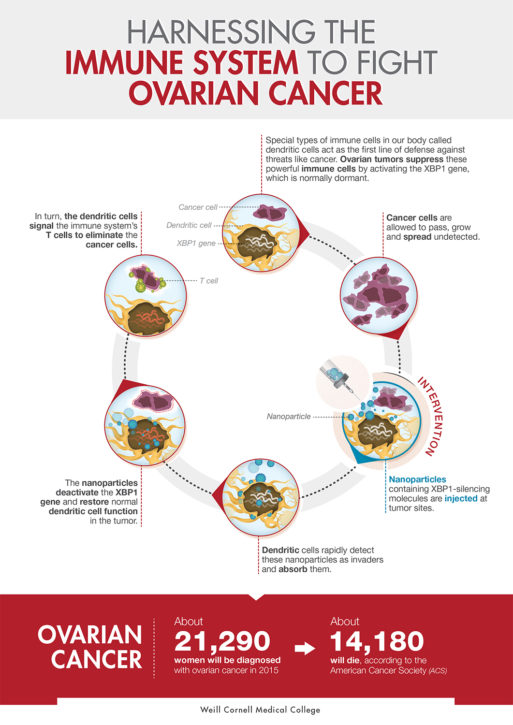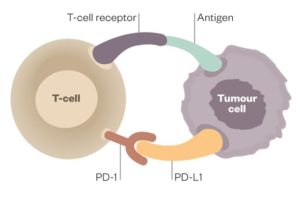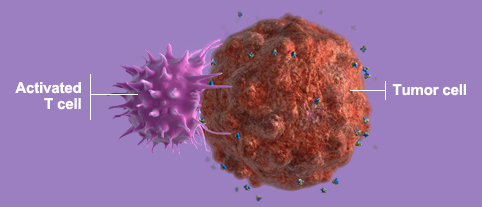Approximately 22,000 women will be diagnosed with ovarian cancer this year, resulting in over 14,000 deaths. This makes it the leading cause of death from gynecologic cancers in the United States. Also known as “the cancer that whispers,” ovarian cancer often spreads to other organs before it is detected or symptoms become prevalent.
While advances have been made in finding and treating the disease, survival rates have only improved moderately. According to the Cancer Research Institute, 80 percent of ovarian cancer patients experience recurrent disease, and more than 50 percent die in less than five years post-diagnosis.
While these statistics may be startling, new advances in immunotherapy offer promising results. Early this past February, the American Society of Clinical Oncology (ASCO) released its “Clinical Cancer Advances 2017” report. It labeled immunotherapy the “2017 Advance of the Year” due to the progress achieved over the past 12 months. ASCO President Daniel F. Hayes, MD, FASCO, FACP tweets that, “Research has proven this approach can be effective against a wide range of hard-to-treat advanced cancers previously considered intractable.”
What Is Immunotherapy?

Credit: Weill Cornell Medicine
Immunotherapy is a broad category of cancer therapies that boost the body’s natural defenses against cancer. In the past, it has worked well for those with ovarian cancer and has since helped those with hypermutated cancers, such as those caused by tobacco or UV light exposure. It has also been extremely beneficial for patients with bladder cancer, head and neck cancers, Hodgkin lymphoma and lung cancer.
Jyoti D. Patel, a professor of medicine at the University of Chicago and a past member of ASCO, states, “Immunotherapy is one of the most important advancements we’ve made in the treatment of cancer in the past decades…We are learning how to combine it with other therapies to improve outcomes for all patients.”
Immunotherapy uses medicines made in a laboratory to improve and restore immune system function. One reason that cancers such as ovarian cancer go undetected is that the immune system fails to identify the cells that cause cancer as malignant. One type of immunotherapy called checkpoint inhibitors disrupts the signals that allow cancer cells to hide from an immune attack.

Credit: www.pharmecutical-journal.com
Of course, there are many other types of immunotherapies that fall under the umbrella term. Cytokines are a type of protein molecule that helps regulate and direct the immune system. Cancer vaccines are also immunotherapies that treat cancer by helping the patient’s own immune system target cancer cells.
Dr. Patel states that there are currently “over 900 trials in immunotherapy drugs ongoing in the United States. We’re just understanding how to put the pieces together.”
Hopefully, as researchers study these immunotherapies further, they will become a solution for the world’s deadliest killer.
Check out more information on immunotherapy and its benefits here.

 Immunotherapy: The Newfound Hope for Ovarian and Other Cancers
Immunotherapy: The Newfound Hope for Ovarian and Other Cancers




 The Spiritual Symbolism of Cardinals
The Spiritual Symbolism of Cardinals
 Meaning-Focused Grief Therapy: Imaginal Dialogues with the Deceased
Meaning-Focused Grief Therapy: Imaginal Dialogues with the Deceased















Radiation and chemotherapy are just two of the treatments prescribed with cancer surgery as the last option to remove cancer cells. The treatment involves the patient being exposed to high doses of radiation Therapy Suffolk( http://www.advancedradiationcenters.com/ ) to prevent the cancer cells from metastasized. One of the latest treatment, immunotherapy, is a promising one for cancer. Immunotherapy is relatively new in the list of treatments for cancer and is used conjunctive with other cancer treatments; it negates the negative symptoms that patients experience. The treatment though is not for all cancer patients as the FDA has approved the treatment for the following types including melanoma, leukemia, Kidney, prostate, breast, cervical, ovarian, colorectal and lung cancer.
Report this comment
Thanks for your input. It’s true that Immunotherapy is quickly becoming a cutting edge treatment option for many types of cancer. However, it is not without side effects and does not actually “negate” the negative symptoms people undergoing cancer treatment experience. It can, however, be less toxic and debilitating than chemotherapy and/or radiation therapy. Here’s hoping that newer and better drugs will continue to improve and extend the lives of those with cancer in the future!
Report this comment